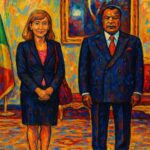A Carefully Orchestrated National Moment
At precisely noon on 9 August, the elegant marble foyer of the Ministry of Justice in Brazzaville echoed with a familiar refrain: the Republic of Congo would “leave no Indigenous citizen behind in the digital century.” Minister Aimé Ange Wilfrid Bininga’s declaration, timed with the United Nations-mandated International Day of Indigenous Peoples, was more than a ceremonial homage. It was a diplomatic signal that Congo intends to anchor its human-rights credentials to the frontier field of artificial intelligence even as capital flows, climate debates, and great-power rivalries converge on Central Africa’s rainforest belt.
From Groundbreaking Statute to Soft-Power Asset
The minister was able to wield a singular data point: Congo remains the only African state that has codified a comprehensive Indigenous Peoples Law, adopted in February 2011. The statute guarantees free birth registration, culturally adapted schooling, and land-use consultation rights. Over the past decade it has supplied Brazzaville with more than legal capital; it has become a soft-power lever in multilateral fora, from the African Commission on Human and Peoples’ Rights to the High-Level Political Forum on Sustainable Development (African Commission 2023). By invoking the law, the government underscores a narrative of continuity rather than improvisation.
Artificial Intelligence as Cultural Insurance Policy
The 2025 U.N. theme — “Indigenous Peoples and Artificial Intelligence: Defending Rights, Shaping the Future” — offered fertile ground. Minister Bininga framed AI not as a disruptive alien force but as a potential custodian of oral histories and endangered languages. According to the draft roadmap unveiled in Brazzaville, data scientists at the African Centre for Research on Artificial Intelligence will collaborate with Teke and Mbenge elders to build speech-to-text corpora, while a forthcoming 4G build-out along the Likouala river seeks to connect forest communities previously reachable only by dug-out canoe. International partners, including UNESCO’s Regional Office in Yaoundé and the German Development Agency GIZ, have expressed interest in funding language-technology micro-grants (UNESCO 2024).
Digital Inclusion Meets Climate Geopolitics
Beyond the human-rights framing, Congo’s strategy intersects with climate diplomacy. The country co-hosts, with Gabon and the D.R. Congo, the Tri-National Initiative on Tropical Forests. Remote-sensing algorithms able to integrate Indigenous ecological markers — such as the seasonal movement of Mbendjele hunter-gatherers — could refine carbon-stock verification and buttress Congo’s case in voluntary carbon markets (World Bank 2023). Officials argue that monetising verified offsets would, in turn, finance community broadband and e-health clinics, creating what one senior diplomat called “a virtuous loop in which ancestral knowledge feeds planetary models and is remunerated for it.”
Lingering Obstacles Acknowledged, Not Minimized
Even the government’s own assessment is clear-eyed. Census data indicate that fewer than 18 percent of Indigenous adults possess national ID cards, a prerequisite for SIM registration under the 2019 telecom regulations. Stigma persists in urban schools where Pygmy children often abandon classes before the secondary cycle. Minister Bininga therefore pledged a bilingual civil-service fast-track and culturally attuned teacher-training modules, insisting that a purely technocratic AI approach would “only replicate bias at machine speed.” Rights groups such as the Network of Indigenous Peoples of Congo cautiously welcomed the tone although they pressed for budgetary clarity (Reuters 2025).
A Calculated Diplomatic Gamble
Brazzaville’s overture arrives as the African Union drafts its continental AI governance framework and as Congo prepares to seek a non-permanent seat on the U.N. Security Council for the 2026-2027 term. By showcasing an inclusive, forward-looking narrative at home, the presidency of Denis Sassou Nguesso is also cultivating external legitimacy. Western envoys murmured approval, noting that Congo’s messaging dovetails with G7 commitments on digital inclusion, while Beijing’s ambassador praised the plan’s compatibility with the Digital Silk Road. Such rare harmony among patrons suggests that Congo’s calibrated blend of ancestral wisdom and algorithmic ambition may indeed prove an unexpected asset on the diplomatic chessboard.



















